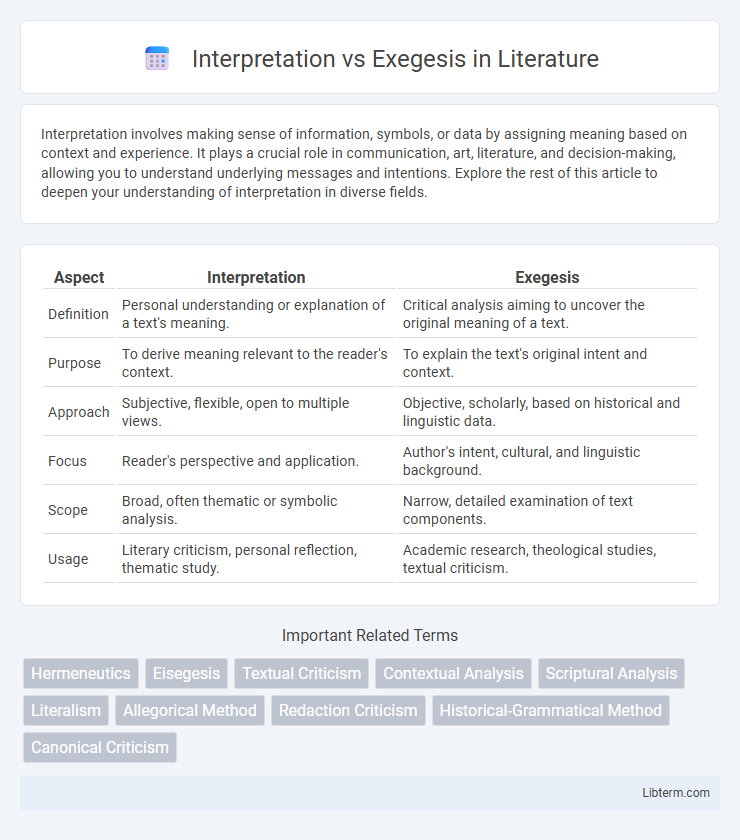Interpretation involves making sense of information, symbols, or data by assigning meaning based on context and experience. It plays a crucial role in communication, art, literature, and decision-making, allowing you to understand underlying messages and intentions. Explore the rest of this article to deepen your understanding of interpretation in diverse fields.
Table of Comparison
| Aspect | Interpretation | Exegesis |
|---|---|---|
| Definition | Personal understanding or explanation of a text's meaning. | Critical analysis aiming to uncover the original meaning of a text. |
| Purpose | To derive meaning relevant to the reader's context. | To explain the text's original intent and context. |
| Approach | Subjective, flexible, open to multiple views. | Objective, scholarly, based on historical and linguistic data. |
| Focus | Reader's perspective and application. | Author's intent, cultural, and linguistic background. |
| Scope | Broad, often thematic or symbolic analysis. | Narrow, detailed examination of text components. |
| Usage | Literary criticism, personal reflection, thematic study. | Academic research, theological studies, textual criticism. |
Understanding Interpretation and Exegesis: Key Definitions
Interpretation refers to the process of explaining or providing the meaning of a text, often influenced by the reader's perspective or context. Exegesis involves a critical, systematic analysis of a text to uncover its original meaning, typically relying on historical and linguistic context. Understanding these key definitions highlights that interpretation is broader and more subjective, while exegesis is grounded in rigorous, scholarly examination.
Historical Origins of Interpretation and Exegesis
Interpretation and exegesis have distinct historical origins rooted in ancient religious and philosophical traditions, with interpretation emerging as a broader method of deriving meaning from texts within various cultural contexts. Exegesis originated specifically within Jewish and early Christian scholarship as a disciplined approach to extracting and explaining scripture by analyzing linguistic, historical, and theological dimensions. Over time, exegesis became formalized through scholastic and patristic methodologies, distinguishing it from the more general and flexible practice of interpretation.
Theoretical Frameworks: How Interpretation and Exegesis Differ
Interpretation involves the broader process of assigning meaning to a text, often influenced by cultural, historical, and personal perspectives, while exegesis is a systematic, scholarly approach specifically aimed at uncovering the original intent and context of the text using linguistic and historical analysis. Theoretical frameworks for interpretation tend to incorporate hermeneutics and reader-response theories, which emphasize subjective understanding and contemporary relevance. In contrast, exegesis relies on methodologies such as textual criticism and historical-contextual analysis to produce an authoritative and objective explanation of the text's original meaning.
Methods and Approaches in Exegesis
Exegesis employs rigorous methods such as historical-critical analysis, textual criticism, and literary analysis to uncover the original meaning of a text within its cultural and historical context. This approach focuses on understanding language, grammar, and author intent using tools like philology and source criticism to provide an accurate, contextual interpretation. Unlike general interpretation, exegesis prioritizes systematic, methodical examination of biblical or classical texts to derive authoritative and scholarly conclusions.
Methods and Approaches in Interpretation
Interpretation involves deriving meaning from a text through subjective analysis, considering context, language, and cultural background, often employing hermeneutical techniques. Exegesis focuses on critical explanation and detailed examination of the text itself, using methods such as linguistic analysis, historical context, and grammatical study to uncover the author's original intent. Interpretation leans on broader conceptual frameworks and reader response theories, while exegesis maintains a disciplined, text-centered approach grounded in philological and theological precision.
Role of Context in Exegesis vs Interpretation
Exegesis relies heavily on historical, cultural, and linguistic context to uncover the original meaning of a text, ensuring a precise and informed understanding. Interpretation, while also considering context, allows for broader application and personal or contemporary relevance, often integrating the reader's perspective. The role of context in exegesis is to limit meaning within the author's intent, whereas interpretation adapts meaning dynamically to current situations.
Common Misconceptions About Exegesis and Interpretation
Common misconceptions about exegesis and interpretation often conflate the two, assuming they are interchangeable processes. Exegesis strictly involves a detailed, scholarly analysis of a text's original meaning based on linguistic, historical, and cultural context, while interpretation applies personal or contemporary perspectives to derive broader meaning. Misunderstanding this distinction can lead to improper application of biblical or literary analysis, compromising accuracy and depth of understanding.
Practical Applications: When to Use Exegesis or Interpretation
Exegesis is essential for rigorous biblical study, focusing on extracting the original meaning from the text through historical, cultural, and linguistic context analysis. Interpretation applies those exegetical insights to contemporary situations, making Scripture relevant and understandable for modern audiences. Use exegesis when accuracy and faithful representation of the original message are crucial; rely on interpretation to guide practical application and spiritual growth in everyday life.
Significance in Religious and Literary Studies
Interpretation involves the broader process of assigning meaning to texts, while exegesis specifically refers to a critical explanation or analysis, particularly of religious scriptures. Exegesis holds significant importance in religious studies as it seeks to uncover the original context and intended message of sacred writings, guiding theological understanding and practice. In literary studies, interpretation allows for diverse readings and subjective insights, enriching the appreciation and relevance of literary works across different cultures and epochs.
Challenges and Debates: Interpretation vs Exegesis Today
Interpretation and exegesis often face challenges rooted in cultural biases and linguistic limitations that impact the understanding of sacred texts. Debates arise over subjective versus objective approaches, with interpretation emphasizing contextual meaning while exegesis relies on rigorous, methodological analysis of original languages and historical settings. Scholars continue to negotiate the balance between personal insight and academic discipline to enhance clarity and authenticity in theological studies.
Interpretation Infographic

 libterm.com
libterm.com